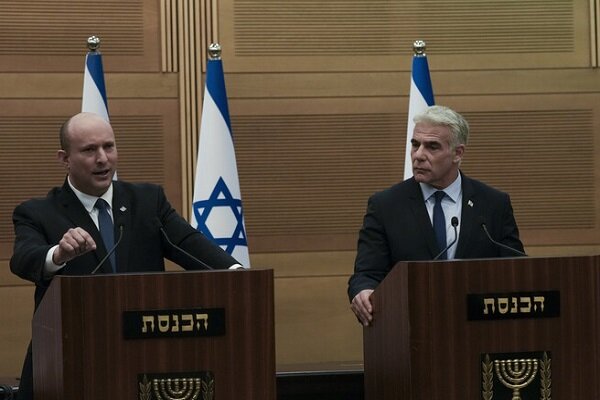Hossein Ajorloo, in an interview with the Website of the Strategic Council on Foreign Relations, continued: When Netanyahu was ousted, it became very clear that the eight groups that made up the cabinet were very heterogeneous; that is to say, from the very extreme left to the extreme right, and even the 1948 Arabs were present in that cabinet.
Ajorloo explained: Over time, the rift between the various factions in the cabinet would increase, and as a result, we saw the dissolution of Bennett’s cabinet.
The expert said that the second reason was the increase in security challenges in the regime, adding: The Palestinian tension with the Zionists in 1967 and 1948 and its subsequent developments, led some of the regime’s extremist currents to deal more harshly with the Palestinians, but the leftists and the Palestinians were against it.
Referring to the opposition to funding for Palestinian projects, he stressed: All of this has exacerbated the rift.
Ajorloo also pointed out that even some members of the right-wing Yamina and Bennett party left the Knesset and brought the cabinet’s credibility under question.
The Middle East expert also referred to Bennett-Lapid plans in the field of foreign policy and their cooperation with the United States, saying: Such actions were not favorable to some currents, because in the opinion of this group of Zionists, they were moving toward the peace process with such measures, and the dominant current, which is right-wing, was against it.
Referring to Netanyahu’s own actions in this direction, Ajorloo said: Netanyahu has recently been able to advance some of his objectives through consultations with various members of the Knesset.
According to the expert, the result of such developments and actions was the dissolution of Naftali Bennett’s cabinet.
Regarding the consequences of the dissolution of the cabinet in the Zionist regime, he said: One of the serious consequences is that most of the political parties opposed to Netanyahu and various countries once considered Netanyahu as the main cause of political instability; but with the defeat of Bennett’s cabinet, it became clear that the agent was not just Netanyahu, but in the left-to-right cycle of the regime, none of the currents could run the cabinet alone, and none of the currents are willing to agree with each other.
Ajorloo stressed that the Zionist regime is now suffering from serious political instability.
He went on to describe the fact that right-wing approaches are now intensifying, and spoke of the possibility of the right-wing taking power and continued: In that case, relations between Washington and Tel Aviv will be affected, and there is the possibility of escalating differences between Biden’s United States and the Zionist regime in some plans.
The expert said: Nevertheless, the strategic alliance between the United States and the Israeli regime will remain.
The West Asia expert, noting that part of the Bennett administration’s inadequacies goes back to security issues, said: Given the gaps and the inability of the government, we are likely to see an escalation of security debates, and crisis management in that regime will be pursued with more anxiety.
He added: In that case, actions such as the martyrdom of Ms. Shireen Abu Aqla, emotional clashes, and marches will also increase.
The Middle East expert also referred to the dissatisfaction of Palestinian Arabs with the election and said: In such circumstances, the Palestinians will probably not run in the elections.
According to Ajorloo, the normalization trends and confrontation approaches with the Islamic Republic of Iran will also face challenges, noting: Although there is coordination and coherence in the Israeli regime regarding the issue of confrontation with Iran, they may face challenges in managing it.
The expert on Israel affairs also pointed to three scenarios regarding the elections and said: First, Bennett and Lapid recently took steps that were able to capture part of the set of votes. In fact, the cabinet was dissolved so that they might be able to gain votes in the next election.
He added: Since Benny Gantz of the Blue and White Alliance, along with Bennett and Lapid, have stated that they will not form an alliance with Netanyahu if they can get more votes, we will probably see the power of Bennett-Lapid and even Gantz in rotation.
Considering the reduction of 1948 Arabs in the Knesset election, it is possible that radical Zionists and right-wing fractions gain more votes, which would result in more power for right-wing fractions like Likud or Netanyahu himself.
The Middle East expert called the third scenario a repetition of the status quo and stressed: In this scenario, none of the parties can reach an agreement to gain a relative majority, in which case the Zionist regime will face conflicts and political unrest and instability will continue in this regime.










0 Comments